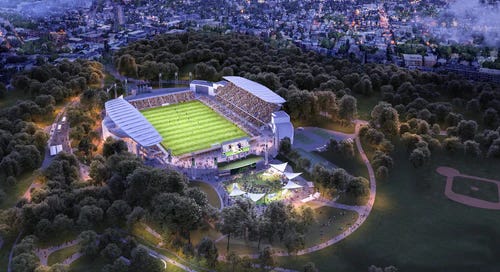Boston could get stuck with an empty soccer stadium | Mass. sees big drop in new home, apartment construction | Josh Kraft pitches his “rent control” plan to landlords | How about The Bunker Hill Battle Bridge? | Quick hits |
From White Stadium to white elephant? Boston Mayor Michelle Wu’s soccer stadium plan could leave city with an albatross on its hands should things go south, expert says
It would certainly seem the sweetest of deals for investors behind plans to bring women’s pro soccer to the Hub.
But for Boston taxpayers, who could get stuck with a $200 million-plus-and-still-counting white elephant, maybe not so much, a top sports business expert warns.
That would be Mayor Michelle Wu’s increasingly shaky plan to build a pro soccer stadium in historic Franklin Park for the city’s fledgling women’s pro soccer team, Boston Legacy.
The project’s costs have already doubled and are likely to rise further, and now the new stadium faces its first major delay as well.
Boston Legacy announced this week it would play its inaugural 2026 season at Gillette Stadium, as its new soccer palace in Boston will likely not be ready for play until 2027.
Meanwhile, the Wu administration has served up a buffet of benefits for the team and its high-powered local investors, all the while leaving city taxpayers exposed - thanks to an unusually short stadium lease - should things not work out, Andrew Zimbalist, one of the world’s top sports business experts, told Contrarian Boston.
The city is providing the land - priceless acres in Boston’s Emerald Necklace, no less –while sharing with Boston Legacy’s investors the cost of the project, which includes new athletic facilities for the city’s schools.
Notably, the city’s ten-year lease deal with Boston Legacy is remarkably short for a stadium deal, leaving taxpayers at risk, contends Zimbalist, professor emeritus of economics at Smith College.
“I don’t know of any other deals where you have a ten-year lease,” Zimbalist said. “Not when the city is committing that kind of money and real estate.”
The lease deal gives the team maximum flexibility, while robbing Boston of the stability and long-term protection a more typical 30-year deal would provide, Zimbalist said.
And those terms could come back to haunt the city, should the popularity of the Boston Legacy and the National Women Soccer League catch fire, as fans and investors both hope.
The stadium Boston Legacy is building in its joint venture with the city will have just 11,000 seats, making it one of the smallest in pro sports.
Once its ten-year lease up, the team might opt to move to a larger stadium or even build a new one at another location.
“It just seems if you are going to go ahead and do a deal like this as a city, you have to negotiate better,” Zimbalist said. “You don’t give this kind of money and real estate for ten years.”
Keep reading with a 7-day free trial
Subscribe to Contrarian Boston to keep reading this post and get 7 days of free access to the full post archives.





